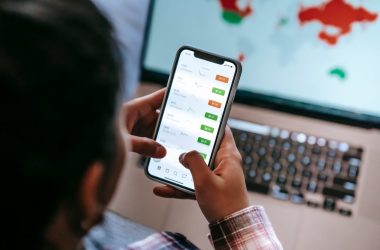Last Updated on: 22nd November 2023, 11:57 am
Rouzbeh Pirouz is Co-Founder and Senior Partner at London-based Pelican Partners, a real estate and private equity investment firm.
It can feel like COVID-19 has been with us for far longer than two years. And while the world continues to battle through a global vaccination rollout, new variants are throwing predictions of global economic recovery off their initial trajectory.
Omicron – where did it come from, and how will it impact the global economic recovery?
By the time we reached the middle of 2021, there was a general feeling that the worst was behind us. Economic outlooks picked up as millions headed back to the office and restrictions lifted in most regions worldwide.
A brief summer of optimism was shut down by the emergence of a heavily mutated variant in November. Now called Omicron, this variant has been traced back to several disparate cases in South Africa. These include students in Pretoria, a South African traveller holed up in a quarantined hotel in Hong Kong and a diplomatic journey to Botswana.
Omicron is baffling scientists and continues to spread rapidly, inexorably and apparently unceasingly around the world. Not only is it jeopardising lives and the efficacy of the initial vaccine rollout, but the new variant also shows us that we can never take COVID-19 for granted.
Economic and humanitarian damage caused by COVID-19 is unprecedented
More than five million people worldwide have died due to COVID-19 since March 2020. And as the world dealt with the Beta and Delta surges, it appears Omicron has been waiting in the background for up to 12 months.
According to Sarah Otto, professor of evolutionary biology at the University of British Columbia, Omicron is more closely linked to forms of COVID-19 that were circulating in 2020, rather than Beta and Delta. In an interview with the Financial Times, Professor Otto says that she believes Omicron has been “hiding for a year.”
New variant casts doubt on predictions for global economic growth
This means that for the past 12 months, Omicron has been quietly evolving in the background, suggesting that COVID-19 is unlikely to follow the pattern of the early 20th century Spanish Flu pandemic and burn itself out.
It appears that the consensus by virologists – for now at least – is that Omicron spent many months mutating in a person with a suppressed immune system and through a chronic infection. However, others say that it has evolved so fast due to the use of anti-COVID treatments and/or it crossed over into a different species, mutated and hopped back to humans.
However Omicron arrived, the global economic recovery is, once again, in doubt.
How will the global economy and global growth be impacted?
While the latest challenge thrown out by COVID-19 is impacting travel restrictions, the simple fact is we don’t yet know how Omicron will affect economic growth and inflation.
The world is locked in a pattern of being unable to plan ahead, which naturally impacts the financial markets.
Having reached what felt like an impasse with COVID-19 and a general view that we’ve largely avoided a global financial crisis, all of this is in doubt.
Fragile global economy in a state of waiting and seeing
According to the head of European economics at forecasting company Oxford Economics, Angel Talavera, there is no way to know how bad it will get at the time of writing.
Experts predict three potential scenarios for the global economy as a direct effect of Omicron, but it will take weeks to reach clarity.
Will vaccines beat the new variant and allow recovery for the global economy?
In the UK, the Government is betting on the vaccine booster programme to limit the economic impact. This is likely to be the plan for all advanced economies.
However, low-income economies, emerging economies and developing countries are way behind on vaccines.
Therefore, how the new variant responds to vaccines is extremely important for its economic impact.
Consumer confidence and global economic growth threatened by restrictions.
If Omicron continues to be largely resistant to the current vaccines, then sustainable economic growth is unlikely.
Economic growth depends largely on consumer confidence, and the reintroduction of restrictions dampens this.
The worst-case scenario from Omicron will send the global economy into yet another tailspin. However, the more positive possibility could spare healthcare systems from crumbling and allow for economic growth and recovery.
Staving off a global financial crisis
A recent report from the Organisation for Economic Cooperation and Development (OECD) shows that global economic recovery in 2021 was more positive than initially predicted.
This report, it must be understood, was put together before Omicron arrived. However, the OECD warns that global economic activity and growth are likely to slow even without the new variant.
Predictions of economic growth in selected countries
According to this report, the most likely scenario varies from country to country. The Eurozone predicts that growth will slow to 4.3% in 2022, down from 5.2% in 2021. In other countries, such as the US, it indicates that 2022 will fall to 3.7% from 2021’s 5.6% growth.
The OECD said, however, that while they are “cautiously optimistic”, the economic response to COVID-19 is vitally important.
According to this report, policy measures must focus on vaccinations to provide relief. This is a very similar message to a year ago, despite all the world’s economic response changes over the last 12 months.
New variant is the latest in challenges faced by financial markets
Both major and developing economies have faced a barrage of challenges since the pandemic started.
From massive fiscal stimulus programmes to rising inflation, the impact has been varied.
Hopes for global recovery and a stable world economy driven by a return to normal life have been raised many times, only to be thwarted by new variants in many countries.
COVID-19 and its unpredictability affects consumer demand
Even before the new COVID-19 variant showed up, Europe dealt with a fourth wave of infections. This led to lockdowns in some countries that were hit hard, including Austria and the Netherlands.
During earlier waves of COVID-19, economies reacted in different ways. In the US and European economies, policy actions included Government support.
Supply chain disruptions impact international trade
As the pandemic continues, we see the repercussions of this kind of policy support.
For example, unemployment rates have fallen as lockdowns and furloughs led to labour shortages.
Fiscal consolidation also led to supply chain disruptions worldwide due to a shortage of materials, which has impacted industrial production rates.
National economies are unlikely to follow a similar fiscal policy again, regardless of the trajectory of the health crisis. Huge amounts of debt have been incurred across the European Union, in emerging economies such as North Africa and Latin America and developed economies in South Asia.
COVID-19 pandemic impacts investor confidence
Health systems are struggling to cope with the upward pressure of the COVID 19 pandemic, and for many, investment plans remain on hold.
Individuals and businesses are waiting in a coordinated manner to see the fallout from the newest variant. Exactly how this will go on to impact inflation rates, consumer demand, and unemployment levels in different countries remains to be seen.
Economic growth will slow
Omicron is just the newest emerging problem, impacting industrial activity, supply chains and economic activity.
Given the way that policy measures have dealt with past waves, there is reason to think that it’s possible to reduce the economic impact of Omicron substantially.
However, in the UK, the Government’s response has been mixed. There are confusing measures that have been announced, and clarity remains some way away.
In the meantime, financial stability continues to be impacted by constant uncertainty.
Demand for vaccines in developing countries must be met
Developing countries are still way behind others in terms of their vaccination programmes, and it’s likely that, until richer countries deal with this discrepancy, the world will be stuck in a continuing pattern of recovery and uncertainty.
The third quarter of 2021 gave us much to be optimistic about regarding economic growth. And while predictions for 2022 were already more subdued, the picture is even more uncertain now that Omicron is here.
How it affects individuals will depend on where they live, the policy support in those regions and various macroeconomic policies.
Although there are soaring energy prices, rising inflation, international trade uncertainty, and further upward pressure from Omicron clouding the picture, we can expect the global economy to largely remain intact.









